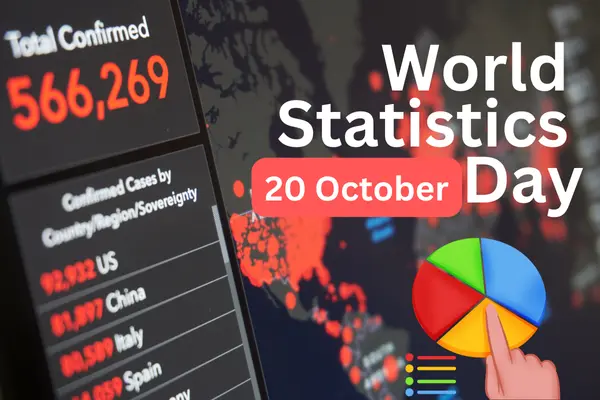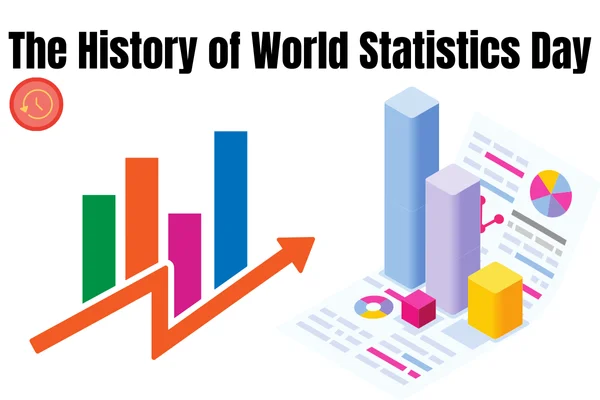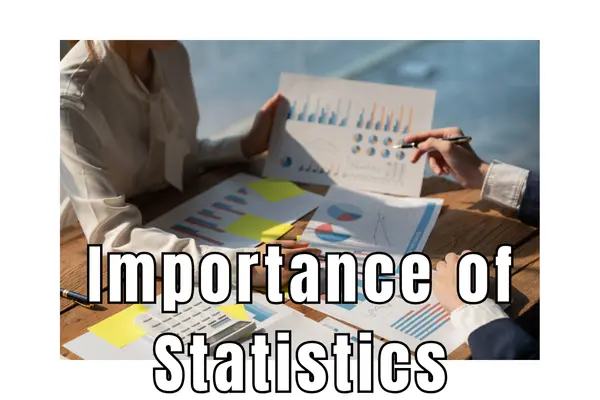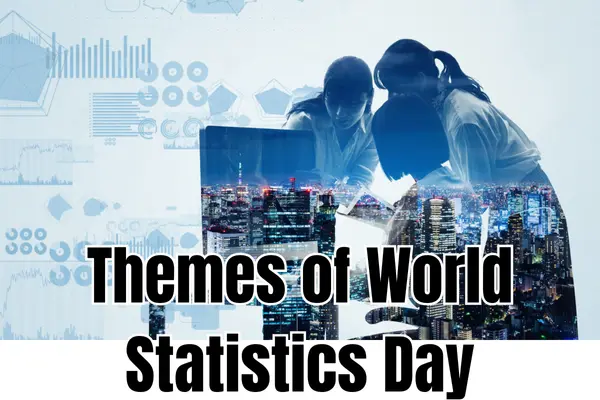World Statistics Day: A Celebration of Data and Its Impact.
Updated: 30 Dec 2024
106

Enjoy World Statistics Day on October 20th, highlighting the significance of data as well as improving the quality of life for all people.
World Statistics Day is celebrated every year on the 20th October. It aims to highlight the significance of data from statistical sources in governing and making policy, as well as in daily life. The initiative, which the United Nations leads, helps to highlight the significance of statistics in making life better for all people worldwide. Each year, the theme for World Statistics Day focuses on the importance of statistics in solving global problems, ensuring that decisions are made well-informed, and encouraging sustainable growth.
The History of World Statistics Day

The inaugural World Statistics Day was celebrated on the 20th of October in 2010. This event was designed to increase consciousness about the significance of statistics in today’s world, particularly in ensuring that government organizations can access accurate data to make decisions.
In the event, the UN General Assembly acknowledged the importance of having robust statistics systems to successfully implement the various development goals internationally. The celebration was accompanied by events, promotions, and other activities organized by statistical offices at the national level and numerous partners across the globe. The popularity of the initial celebration led to the creation of the subsequent World Statistics Days in 2015 and 2020. Each year, distinct themes reflected the changing nature of statistics requirements and issues.
Importance of Statistics

Statistics are vital in health, economics, education, and social sciences. They aid in understanding complex processes and support evidence-based decision-making
Here are the key benefits of statistics:
- Informed Decisions: Statistics aid decision-making in both public and private sectors. Policymakers use it to address economic, social, and environmental issues.
- Resource Management: Statistics help identify where to focus resources. This ensures funding goes to the most needed areas.
- Progress Tracking: Statistics monitor progress towards goals like the Sustainable Development Goals (SDGs). They assess strategy effectiveness and suggest necessary changes.
- Raising Awareness: Statistics highlight issues like income inequality, health gaps, and environmental concerns. They enable public involvement and advocacy for change.
Themes of World Statistics Day

World Statistics Day is marked by a theme that reflects global trends and issues every year. The themes inspire discussion and discussions on the importance of statistics. Examples:
- 2010. The first World Statistics Day topic was “Celebrating the many contributions of statistics to the improvement of the well-being of society.” It highlighted the significance of statistics in improving living standards.
- The year 2015 The topic of the conference was “Better data, better lives,” focusing on the need for reliable and up-to-date data to enhance living conditions and promote sustainable growth.
- 2020: The theme chosen is “Connecting the world with data we can trust.” The theme also highlighted the importance of confidence in data and the necessity of worldwide cooperation to ensure access to data and quality.
The Role of National Statistical Offices

National Statistics Offices (NSOs) play a crucial role in collecting, analyzing, and disseminating statistics. They ensure that statistical data are trustworthy, up-to-date, relevant, and timely to the requirements of the countries they serve. They also work with international organizations like The United Nations and the World Bank to align their practices in the field of statistics with international guidelines. The duties of NSOs comprise:
- Data collection: The NSO conducts censuses and surveys to collect information regarding various aspects of society. This includes demographics of the population along with economic activity, as well as health indicators.
- Analytics of Data When data has been taken in, NSOs examine the data to gain conclusions, discover trends, and assist decision-makers.
- Dissemination NSOs are accountable for providing statistical information to researchers, the general public, and makers. They release data, reports, databases, and visualizations that effectively communicate the findings.
- Capacity Building NSOs also increase statistics literacy and capacity in their own countries. They also provide resources and training for improving analytical and data collection skills across various stakeholder groups.
Challenges in Statistics
Despite the vital role of statistics, there are still a lot of challenges in the sector. They include:
- Data Quality: Ensuring the quality and accuracy of data poses a significant issue. Various factors, including ineffective data collection practices or inadequate training and insufficient resources, could compromise the quality of the data.
- Access to data: Access to accurate statistics is only sometimes available in certain regions. This could hinder the effectiveness of the decision-making process and policy implementation. Literacy: There’s an urgent need to increase statistics literacy among people of all ages and even policymakers. Knowing how to interpret data and the implications of it is essential in making informed choices.
- Technological Innovations: Speedy technological advancements present many opportunities and challenges to statisticians. Although new technology can improve data collection and analysis, it can also cause data privacy and security concerns.
| The Future of Statistics |
|---|
|
The future of statistical research is expected to be shaped by a variety of developments:
|
Conclusion
World Statistics Day is a day to remember the importance of statistics in our daily lives. By promoting the importance of data, we can promote an informed culture and empower people and groups to participate in discussions that can lead to changes.
In honor of the day of statistics, let’s be aware of the work done by statisticians and the essential significance of data in making a better tomorrow for all. Collaborating, innovating, and committing to high-quality data will help us tackle worldwide challenges and contribute to sustainable progress.
Frequently Asked Questions (FAQs)
What is World Statistics Day?
It is a day designated by the United Nations to celebrate the importance of statistics in societies and economic development.
What is the reason it’s observed annually every five years?
The reason is that it increases the quality of the celebration and makes every celebration more significant.
What’s the role of statistics in the sustainable development process?
Statistics provide data and metrics required to monitor development progress and help guide initiatives.
How do I get involved in World Statistics Day activities?
You can attend local events, participate in discussions online, and promote statistical literacy.
In conclusion, World Statistics Day reminds us that accurate data and reliable statistical analysis are essential for understanding the world around us and making educated choices. With the increasing complexity of issues across the globe, the value of statistics in making decisions, monitoring growth, and promoting sustainable development is not overstated.
By promoting awareness of statistics and literacy, we can contribute to an educated and informed society that is able to meet the issues that the 21st century brings.
The commemoration of World Statistics Day serves as a catalyst to increase knowledge and application of statistics in everyday life by reminding us that beneath each number, there is an important story that can create a better future for everyone.
Please Write Your Comments